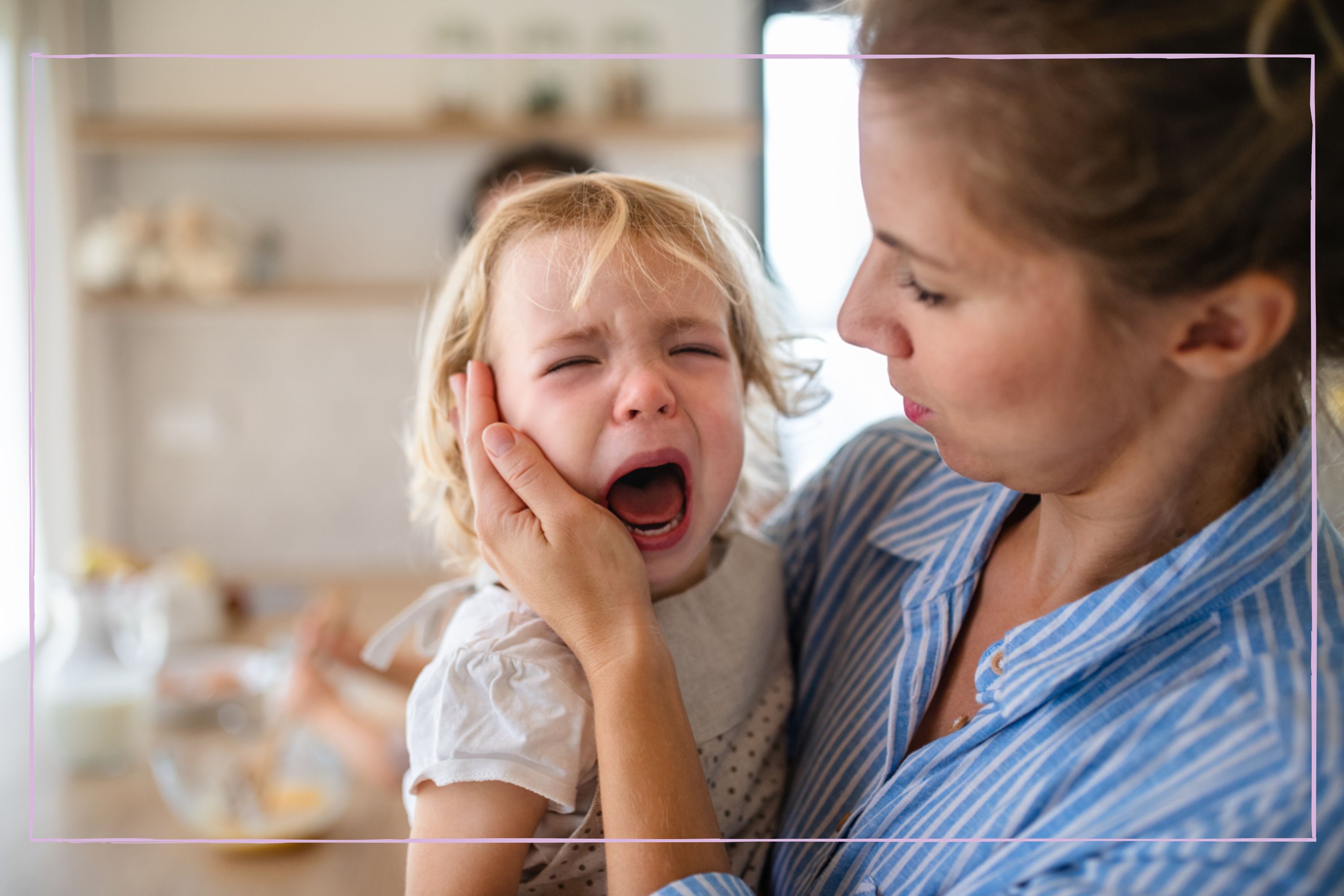15 subtle ways your child expresses anxiety that you might have missed, and how to manage it flawlessly according to a therapist mum
Is your child anxious? Here's some tips on identifying and dealing with it flawlessly


There are 15 common signs your child is expressing anxiety, but parents can easily mistake it for a temper tantrum, according to a therapist-mum. Here's what she suggests you should do about it instead of getting cross.
Parenting is not easy, and if you're suffering from 'mum guilt' or are struggling with how to explain the mental load to your partner while trying to juggle work, home and looking after your kids then even the slightest thing your child says, such as "I can't sleep" or "I don't know" when you ask them a simple question can make you lose your patience, especially at bedtime.
But mum Melissa, who is also a therapist on TikTok, @momtherapist, has discovered the hidden ways children communicate anxiety - and it's not as easy to spot as you'd think. After all a child might not be able to express anxiety through commonly known symptoms including sweating, trembling or shaking, having heart palpitations or feeling irritable, tense or restless.
She said, "Kids talk about anxiety in a whole lot of ways that parents don’t pick up" and proceeded to share on TikTok 15 ways kids say they're feeling anxious without actually saying it.
15 ways kids say they're feeling anxious, without actually saying so...
- My tummy hurts
- I don't wanna go to school
- I'm not hungry
- I hate you
- What if...what if...what if...
- I need to pee again
- I can't sleep
- I don't know
- My legs hurt
- I just want to stay with you
- Nobody wants to talk to me at school
- Nobody likes me
- My arms hurt
- I think I'm getting sick
- I don't like it
In response, some parents have admitted they can now recognise these traits in themselves from when they were a child, while others are noticing these phrases cropping up with their own children.
One parent shared, "As a mom of a child with anxiety: be their safe space to vent, scream, cry. Provide a consistent, safe and stable environment. Learn to pick up on these."
Another parent added, "When I was in first grade I missed a month of school because "my tummy hurts" my mom took me to a million specialists and put me on a bunch of meds for stomach problems. turns out I just have severe anxiety."
GoodtoKnow Newsletter
Parenting advice, hot topics, best buys and family finance tips delivered straight to your inbox.
And a third parent said, "Thank you for this! I was trying to figure this out a few weeks ago before my son's online class. He was saying he didn’t want to go to class and so that’s when I got curious as to what he was feeling. Now I know what other stuff to look for."
Melissa explained what she does to help her children understand what they are feeling. She explained, "If kids understand what they’re feeling and when they’re feeling it, then we can cope with it appropriately.”
"We're just going to help them spend a little less time on their worries," the therapist added and suggested parents invest in keeping a worry-timer, a 10-15 minute set time where parents listen to their child's worries. She clarified, "We're not going to solve problems or offer solutions. We're just going to listen."
She also suggested saving a child's worry for a worry time and keeping the child "distracted by doing something fun or enjoyable."
In other family news, another change of behaviour in children might make you think Is your child not playing with their toys? 3 reasons why and what to do about it and what to do when they say 'I'm NOT going to school today'.

Selina is a Senior Family Writer for GoodtoKnow and has more than 16 years years of experience. She specialises in royal family news, including the latest activities of Prince George, Charlotte, Louis, Archie and Lilibet. She also covers the latest government, health and charity advice for families. Selina graduated from the University of Sheffield in 2006 with a degree in Journalism, and gained her NCTJ and NCE qualifications. During her career, she’s also written for Woman, Woman's Own, Woman&Home, and Woman's Weekly as well as Heat magazine, Bang Showbiz - and the Scunthorpe Telegraph. When she's not covering family news, you can find her exploring new countryside walking routes, catching up with friends over good food, or making memories (including award-winning scarecrows!)
-
 The 'incredibly helpful' 30-second rule – liked by nearly 2 million people – that your kid needs to know about
The 'incredibly helpful' 30-second rule – liked by nearly 2 million people – that your kid needs to know aboutThis useful piece of advice is worth remembering for all of us, not just our children
By Adam England
-
 What is ‘sturdy parenting’? Child psychologist Dr Becky explains the benefits of this technique
What is ‘sturdy parenting’? Child psychologist Dr Becky explains the benefits of this techniqueIf you're at a loss when it comes to disciplining your kids, sturdy parenting might help - and it's approved by child psychologist Dr Becky.
By Ellie Hutchings
-
 3 tips to set screen time boundaries from parenting experts Dr Becky Kennedy and Professor Emily Oster - and #1 is an important reminder
3 tips to set screen time boundaries from parenting experts Dr Becky Kennedy and Professor Emily Oster - and #1 is an important reminderStruggling to set screen time boundaries with your kids? Parenting experts Dr Becky Kennedy and Professor Emily Oster have shared three top tips.
By Ellie Hutchings
-
 Could 'lazy parenting' be the next big thing? 2 psychologists share why it can be beneficial for development, but not everyone agrees
Could 'lazy parenting' be the next big thing? 2 psychologists share why it can be beneficial for development, but not everyone agrees'We need more lazy parents' and here's why, according to two child psychologists
By Ellie Hutchings
-
 Parents, do you know what H.E.L.P. stands for? Psychologists swear by this acronym to navigate those tough parenting moments we all face
Parents, do you know what H.E.L.P. stands for? Psychologists swear by this acronym to navigate those tough parenting moments we all faceRemember: Halt, Empathy, Limits, Proximity...
By Ellie Hutchings
-
 Sticker charts 'don't work in the long run' says psychotherapist - try these 8 tips to teach kids intrinsic motivation instead
Sticker charts 'don't work in the long run' says psychotherapist - try these 8 tips to teach kids intrinsic motivation insteadOne expert has explained eight things you can do as a parent to help your child develop intrinsic motivation - and it means abandoning the sticker chart.
By Ellie Hutchings
-
 Reflective parenting could help your teenager manage their big emotions, new research shows - here are 5 steps to try
Reflective parenting could help your teenager manage their big emotions, new research shows - here are 5 steps to tryThe teenage years are tough for everyone involved. But research has suggested that an approach known as 'reflective parenting' can be the key to reconnecting.
By Ellie Hutchings
-
 These 5 'game changing' phrases can teach your children about the mental load, according to a psychologist - and it could set them in good stead for adulthood
These 5 'game changing' phrases can teach your children about the mental load, according to a psychologist - and it could set them in good stead for adulthood"Change at home can change society"
By Ellie Hutchings